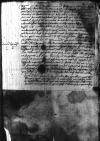List #56
[Ioannes DANTISCUS] do [Samuel MACIEJOWSKI][Marienburg (Malbork)], [ca. 1544-09-25]
Regest polski:
Swoje stanowisko niedawno razem z kasztelanem elbląskim Stanisławem Kostką przedstawił w liście z Malborka, po tym jak zakończył działalność w komisji królewskiej do sprawy [odzyskania przez Zygmunta I] Pucka. Nie ma pomysłu, co lepszego mógłby jeszcze doradzić. Nie poruszył tej sprawy w liście do króla, gdyż ma świadomość, iż przy jego odczytaniu będzie obecny prymas [Piotr Gamrat], całkowicie oddany Constellatusowi [Johannowi von Werden]. Jeśli owe nieposłuszeństwo pozostanie bezkarne, co jego zdaniem nastąpi, będzie wolny od wielu myśli, które zdarzają mu się w sprawie interesu króla. Będą mu się zdarzały inne, kiedy zobaczy zupełnie zniweczone wśród naszych [mieszkańców Prus Królewskich] poważanie dla króla, a jeszcze bardziej dla rady koronnej, o którego stanie w ostatnich czasach adresat przekonał się sam. Jeśli zostanie ustalona łagodniejsza kara, Dantyszek opowiada się za karą 10 000 florenów. Jeśli zaś posiadanie będzie utrzymane siłą, trzeba będzie odzyskać je także siłą. Uważa, że wyznaczonych na sejm Królestwa Polskiego należy wezwać razem z Constellatusem [Werdenem], o czym napisał wcześniej do kasztelana elbląskiego [Stanisława Kostki]. Jeśli się nie stawią, trzeba będzie podjąć stosowne kroki.
Dantyszek oczekuje przyjazdu Papużki [Petera Papuschki]. Prosi, by adresat poinformował go razem z nim, jakie wiadomości dotyczącego jego krajan [gdańszczan] przywiózł poseł cesarski [Alfonso d’Aragona]. Tą drogą można się dowiedzieć wielu rzeczy, które kiedyś mogą się przydać.
Dantyszek prosi o instrukcję, co zgodnie z wolą króla ma uczynić z listem gdańszczan dotyczącym sześciu tysięcy florenów, który zostawili u niego komisarze [do sprawy odzyskania przez Zygmunta I Pucka: Jan Sokołowski, Johann von Baysen (Bażyński), Paweł Płotowski]. Zaaresztował go w imieniu króla kasztelan elbląski. W Gdańsku skarżą się na Dantyszka, że zabrał list siłą. Opinię taką upowszechniono wśród plebsu, który mu złorzeczy.
Rękopiśmienne podstawy źródłowe:
| ||||||
Tekst + aparat krytyczny + komentarz Zwykły tekst Tekst + komentarz Tekst + aparat krytyczny
Postscript No. 1:
Reverendissime mi Domine.
Consilium meum cum generoso domino
Exspecto cupidissime
Postscript No. 2:
Quid cum litteris
